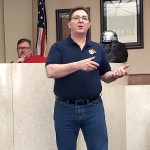Fiscal Court hears from Flash Steel founder
Published 11:42 am Tuesday, April 15, 2025


Gary Cola, the CEO and founder of Flash Steelworks, gave a presentation to the Bell County Fiscal Court on the progress being made toward the company opening a plant in Middlesboro at their April meeting.
Judge-Executive Albey Brock introduced Cola to the magistrates as well as the audience watching the live stream of the meeting and said he would be able to answer any questions they had about the project.
“I know that, just like with any great thing, there are always rumors and always naysayers who like to say the work has stopped or Flash is not coming,” Brock said. “After you see this presentation you’ll know the people who are saying that are. . . just being negative and basing what they’re saying on wanting to see it fail or who just don’t want to see success.”
Cola said he has been working on Flash for over 20 years.
“What we’ve developed is a new way to make steel stronger, harder, weldable, but not brittle,” he said.
He explained that the steel industry has done a great job over the last hundred years or so in developing fancy alloys and using “half-a-billion dollar furnaces” that are expensive to purchase and expensive to run.
“We found a different way to heat treat steel. To be honest, we’ve done about a half-dozen things wrong according to traditional metallurgists, but when we did those things differently we actually ended up with a really interesting product,” Cola said.
Cola explained that Flash is simply a new way to heat-treat steel. Instead of spending minutes or hours in a furnace, the steel is quickly heated to up to around 2100 degrees Fahrenheit in a matter of two to six seconds and plunged in water to cool.
He said the company can take off-the-shelf steel and after the Flash process it is strong enough to bear up to 300,000 pounds per square inch.
“It isn’t necessarily the strongest steel on the planet, but when you consider it is weldable, it’s affordable and it’s not brittle, it’s the best steel out there,” Cola said. “The bottom line is that our steel is stronger, more bendable, formable, tougher and more robust than anything the global steel industry can produce today.”
He said they use the same kind of steel that can be purchased at Home Depot.
“If you go buy a strap to hold up your garage bracket, that’s probably the AISA 1010, if you think of something like 4130, that’s what rollbars on the back of pick-up trucks or dune buggies are made of. The 1530 is the white painted steel you see on the side of the road for propane tanks. . . It’s very, very basic steel, not fancy alloys that require a lot of costs,” he said.
Cola said Flash has dozens of patents around the world protecting their technology so their plant will have a very long lifespan.
He shared a slide with examples of the different parts and pieces Flash can make for vehicles. Those include B-pillars, roof rails, floor reinforcements, fuel shields as well as armor plates.
Cola said the biggest project going on with Flashsteel is building two production lines to make Flash armor.
“The Army wants two production lines so there is always a back-up source,” he said. “What you’re going to see today is from the ‘little brother’ machine, if you will, compared to what’s going to be going on in Middlesboro.”
The product is known as Flash 600 Ultra-hard armor. Cola said the goal of the company’s project with the Army is production of affordable, non-brittle, high-performance, weldable, ultra-hard steel armor.
“That’s a mouthful, but it really encompasses everything the Army is looking for in a metal to make the performance better,” he said.
The Army’s goal with their agreement with Flash is to see its capacity to grow to where they are producing a 4-foot by 10-foot piece of armor every two or three minutes.
“The Middlesboro plant will do just that. We’ll have the capacity for about eight tons per hour of armor so we’ll actually be running about five to ten times faster than a furnace and making a better product,” Cola said.
He also shared slides of the production line in Michigan and explained that they use 21-ton coils of steel that are unrolled and fed into the line and run through the system to be treated with the flash process.
A big key for the Middlesboro plant is the county has a dedicated 8 megawatt power station that will be leased to Flashsteel. It produces 10,000 amps at 480 volts.
“We have more power here than possibly the entire town of Middlesboro,” Cola said. “We’ve worked closely with KU and taken great steps to make sure that when we turn our equipment on we’re not going to brown out the city. We’re installing something called six-phase power rather than three-phase power.”
The Middlesboro plant also features a 50-ton overhead crane that fully spans the 100-foot width of the building.
Cola said the reason for such a powerful crane is that there are discussions ongoing to connect the site to the nearby railroad and have 42-ton coils of steel on railcars.
“That will be more cost-effective and when we turn the machine on it can run longer,” he said. “Right now when we turn the machine on, a single coil of steel will take about three hours to process. If we can make it run six hours continuously that’s just that much better.”
Current plans are for the Flash Steelworks plant in Middlesboro to begin operating in late fall. The building has been completed but the final step is getting it ready to house all of the equipment.
“The piece of equipment that uncoils the steel alone weighs about 225,000 pounds so that needs soil borings down to the bedrock and irons put in. It’s just all part of the design that we’ve been working with the team to put this together so when we put it in, it all works right,” Cola said.
He said the company has been operating with funding from the U.S. Army under development contracts and has been pre-approved for a $90 million blanket order from the Army.
He also has a sales team working to try and secure private sector contracts so the company can grow to run three shifts out of the Middlesboro plant. They are already in discussions on financing for a second phase that will double the size of the building.
“This is not just a start and a possible walk-away. The Army is fully vested in this,” Cola said. “The Army just gave us a $7.75 million contract to develop stainless steel. We are the only people on the planet that have made a working stainless steel armor. Ours is weldable and low-cost. That armor will be produced on the line in Middlesboro.”
Magistrate Eddie Saylor asked how many employees the plant will have when it first opens.
Cola said there are already four people from southeastern Kentucky working in Michigan getting trained on the equipment and a total of seven people from this area who are employed by Flash right now.
“We’re probably going to open up with ten or twelve people,” he said. “Right now we are looking for people that have mechanical abilities. If you know somebody who worked on high-wall miners or worked on bull dozers, we’re looking for those kind of people.”
He said ultimately the building will have over 100 people in it with the second half of the building employing that many as well.
“We’re actually talking to companies in Michigan about coming down here,” Cola said. “As you notice, there is a little bit of land behind us and we’d like to see a full industrial park develop and bring some of the automotive prototyping and stamping work here as well.”
Magistrate Glenn Webb asked about the hourly wage for employees.
Cola the current average was about $28 per hour.
“That’s the labor rate, not including benefits. But the rates are going to get higher as people become machine operators,” he said. “Right now we’re living on Army grant funding so we can’t pay people what we’d really like to, but the pay should be good.”
There will be a wide variety of jobs once the plant is up and running, from the obvious like plant manager, accounting and the HR department and sales. Cola said a PhD metallurgist had just been hired locally and there would be equipment operators and maintenance technicians and two people working to build pallets to ship the steel out.
Applications for Flashsteel are being accepted at Bell-Whitley.
Saylor and Brock both thanked Cola for taking the time to come to the meeting and talk about the project.








